| Two weeks after they beached their boats and called off fishing, following the recent fuel hike and the subsequent death of a fisherman at Chilaw, allegedly at the hands of the police, fisher folk in the northwestern (NW) province are gradually returning to the sea, because their survival depends on it.
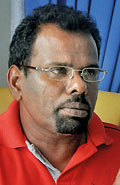 |
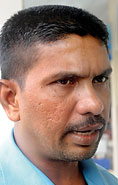 |
 |
| Jude Fernando |
Jayasiri Wickramaaracchchi |
Roshen’s sister |
They are not happy, and while they curse the intransigence of the authorities on this burning issue, the fishermen must get back to sea, because this is their livelihood. However, they have vowed to fight on another day, until their problems are addressed in a fair and just manner by the Government.
However, another reason for the fishermen to cave in under pressure was the disunity among the group itself, with the north, south, east and west voicing different opinions, at the end of the day, it only went on to strengthen the hard line adopted by the relevant authorities.
While those on the NW coast held on for two weeks, fishermen in other parts of the country went out to sea, saying that they were happy with the subsidy on fuel granted by the Government, and were optimistic of getting better prices, due to a scarcity of fish in the public markets.
Manjula Priyantha of the Matara District Multi-Day Boat Owners’ Co-operative Society said the bulk of the fishermen in the south went out to sea despite advice against it.
“The fishermen believed in the Rs 30,000 fuel concession offered by the Government, and there was no looking back. It is clear that the Government was buying for time, until the Chilaw tension dissipated and the fishermen over here swallowed the bait”, he said.
“This kind of disunity is damning in a situation such as this. There was no increase in fuel prices in the international market, although the Government claimed the opposite, to justify the rise in the local prices.
If unity prevailed in the industry, with all stakeholders cooperating with each other, the State would have been forced to have a re-think, but sadly, it is not the case, and the fishermen have only themselves to blame,” Mr. Priyantha added. Dinesh Fernando of the All Ceylon Fisher Folk Trade Union echoed similar sentiments, saying that the fishermen were compelled to go out to sea from the middle of this week, in order to survive.
He said that moves were under way to launch well organised protests in the near future, without harming the day-to-day lives of the fishermen.“This protest was launched at very short notice, following events that followed the price hike in petroleum products and the subsequent death of a young fisherman. We hope to have better planning the next time around,” Mr. Fernando added.
“Dostharayata thama leda hoyanda ba (The “Dr.” reference to Fisheries and Aquatic Minister Rajitha Senaratne “is yet to diagnose the sickness,” is how Jude Fernando, leader of the fisherman’s protest in Negombo, put it.
He said that, unlike in other areas of the fishing belt in the country, the NW coast was different, because fishermen have to venture far into deep seas for a catch, and this means more fuel.
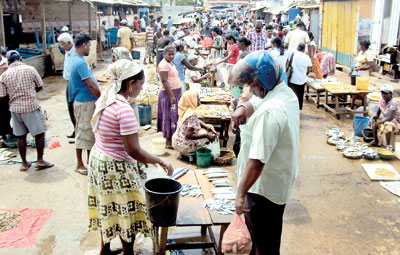 |
| Chilaw fish market on Thursday: Business slowly picking up.
Pix by Augustin Fernando |
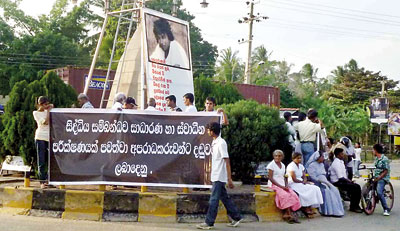 |
| Remembering Roshen: Every month friends and family hold a protest in front of the Seeduwa Police. Pic by N. Kumarasinghe |
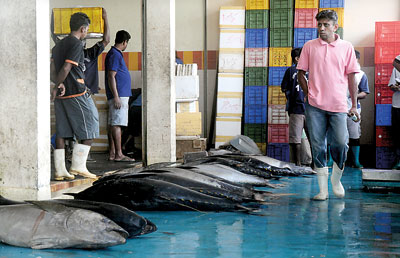 |
| Peliyagoda fish market: Prices have gone up but quality was down during the recent problems in the NW coast. Pix by Saman Kariyawasam |
In other areas such as the east coast, fishermen make their catch sometimes a mere two km from the shore, and therefore, minimum reduced fuel consumption.
“It is not the case here. Boats go out about 10 to 15 km, sometimes even further, and hence large fuel consumption, be it diesel or kerosene. That is why we are most concerned about the prevailing situation,” he added.
He said that the smaller boats, and to a certain extent the multi-day trawlers, decided to go out to sea because it is their only source of livelihood, adding that the Rs. 30,000 monthly fuel subsidy was not clear in intent.
“We strongly suspect that this so-called subsidy will not last two months, and matters will be back to square one,” he said.
The authorities have decided to provide a litre of diesel for Rs 103 to the fishermen, against the street price of Rs 115, and not exceeding Rs. 30,000 a month.
Fisheries Secretary Dr. Damitha de Zoysa said that the fishermen had nothing to fear, adding that the Government was sincere in its pledge and nothing would change it. “The subsidy scheme will be implemented in a methodical manner, so that it is fair by those involved in the fishing industry. For their part, the fishermen should be reasonable and appreciate what has been offered to them, instead of making baseless utterances,” Dr. de Zoysa said.
She also hailed the Roman Catholic Church for its cooperation in settling the issue, but cautioned against an unnamed Non Governmental Organisation that maybe fuelling the crisis. “This cannot be ruled out, as it has been the case in other issues in other parts of the country,” Dr. de Zoysa added. |







